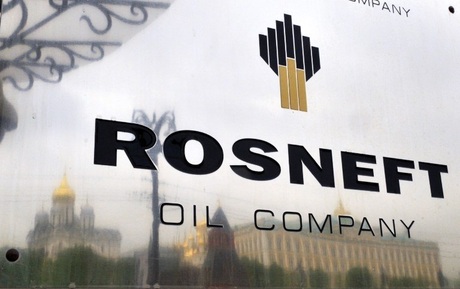Libya: NOC signs a framework agreement with Russia’s Rosneft
Published on Tuesday 28 February 2017 Back to articles
The Kremlin is reflected in the polished company plate of the state-controlled Russian oil giant Rosneft at the entrance of the headquarters in Moscow, on May 17, 2011. Rosneft on May 17 shattered BP’s hopes of exploiting Russian Arctic oil by pulling out of a planned joint venture with the British giant after losing patience with protracted negotiations. AFP PHOTO / DMITRY KOSTYUKOV

Mustafa Sanalla, chairman of Libya’s National Oil Corporation (NOC), and Rosneft’s chairman, Igor Sechin, signed a Cooperation Framework Agreement — laying the groundwork for increased Russian investment in Libya’s oil sector — on 21 February on the margins of International Petroleum Week in London. According to Sanalla, the agreement was part of a greater NOC effort to increase production to 2.1 million b/d by 2022, and especially by attracting around US$20 billion in foreign investment to increase efficiency and exploration.
NOC and the state-owned Rosneft agreed to form a joint working committee to evaluate opportunities to invest in exploration and production. Sanalla is particularly interested in expanding foreign investment in exploration, production, technology and training. They also signed a crude oil offtake agreement, which could secure access for Rosneft to purchase more of Libya’s future oil production.
Sechin is one of President Vladimir Putin’s closest advisors and the move should be seen as part of a broader Russian strategy to expand its influence in the MENA region while the US continues its retreat. Rosneft announced similar intentions to become more involved in the Iraq’s Kurdistan region at the same time (see our sister publication, Iraq & Kurdistan Focus – February 2017). Rosneft’s expanded involvement in Libya would also provide Russia with more political and economic influence along NATO’s southern front.
NOC is, however, more interested in finding other interested IOCs with whom to work rather than to understand the motivations for such agreements among counterparts such as Rosneft. Sanalla is in similar negotiations for investment agreements with Libya’s much more important existing producers such as Eni, OMV and Total, whose host countries back the internationally recognised GNA and not Haftar, as Russia appears to do.
Despite divisions between Russia and the West over Libya policy, US Africa Command chief General Thomas Waldhauser stated at the Munich Security Conference early last week that increased Russian involvement in Libya should not be feared. Instead Rosneft’s multi-billion dollar investments could increase Russian leverage in Libya and empower it to press Haftar to compromise. Ultimately any investment would be very risky in the current security climate, and especially because oil sector infrastructure remain key targets for attack because its control is still used as a political weapon.



